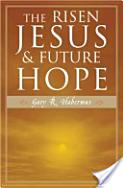- Premise 1: God Cannot Err
- Premise 2: The Bible is the Word of God
- Conclusion: Therefore, the Bible Cannot Err[1]
In other words, if one could prove that God cannot err and that the Bible is the Word of God, it would logically follow that the Bible cannot err and is therefore inerrant. Geilser and Howe summarize the situation as follows, “The conclusion, then, is inevitable. The Bible cannot err. If the Bible erred in anything it affirms, then God would be mistaken. But God cannot make mistakes.”[2]
To evaluate whether this conclusion is correct we will examine each premise under the microscope of Scripture. The Bible clearly supports the claim of Premise 1: God Cannot Err.
- Hebrews 6:18—That by two immutable things, in which it was impossible for God to lie, we might have a strong consolation, who have fled for refuge to lay hold upon the hope set before us:
- Titus 1:2—In hope of eternal life, which God, that cannot lie, promised before the world began;
In John 14:6, Jesus Christ states, “I am the way, the truth, and the life: no man commeth unto the father but by me.” Notice that Jesus Christ, who calls himself the truth in this passage uses the same terminology in reference to the word of God in John 17:17. The verse states, “Sanctify them through they truth: thy word is truth.” It is therefore clear that Premise One: God Cannot Err is true.[3]
Premise Two asserts that the Bible is the Word of God. As shown by Dr. Geisler, the fact that the Bible is the Word of God can be discerned from the following five Biblical affirmations:
(1) the Bible is God-breathed
(2) the Bible is a prophetic writing
(3) the Bible has divine authority
(4) the Bible claims to record what God has said
(5) the Bible is called the Word of God.[4]
In II Timothy 3:16 the Apostle Paul writes, “All Scripture is given by inspiration of God, and is profitable for doctrine, for reproof, for correction, for instruction in righteousness.” Inspiration is the process whereby God breathed through the pen of human authors the very words that He wanted written down. Before God moved to inspire even one word of Scripture, it had already been settled in heaven according to Psalms 119:89.[5] Consequently, inspiration is the process whereby God, communicates through human authors to mankind the words he had previously settled on. Accordingly, Jesus responds to the devil’s temptation to turn stones into bread in Matthew 4:4 by quoting the Old Testament, “. . .man shall not live by bread alone, but by every word that proceeded out of the mouth of God.”
How then did God accomplish the communication of his very words to mankind? II Peter 1:20-21 clarifies how God took his eternally established Word and communicated it to humanity.
“Knowing this first, that no prophecy of the Scripture is of any private
interpretation. For prophecy came not in old time by the will of man: but
holy men of God spake as they were moved by the Holy Ghost.”
These verses and many others illustrate what Geisler calls the prophetic nature of the Bible. In short, the prophets as the mouthpieces of God, spoke only the words that God put in their mouths.[6] Consider the following passages:
- Exodus 4:14-15--And the anger of the LORD was kindled against Moses, and he said, Is not Aaron the Levite thy brother? I know that he can speak well. And also, behold, he cometh forth to meet thee: and when he seeth thee, he will be glad in his heart. 15) And thou shalt speak unto him, and put words in his mouth: and I will be with thy mouth, and with his mouth, and will teach you what ye shall do.
- Numbers 22:38--And Balaam said unto Balak, Lo, I am come unto thee: have I now any power at all to say any thing? the word that God putteth in my mouth, that shall I speak.
- II Samuel 23:1-2-- Now these be the last words of David. David the son of Jesse said, and the man who was raised up on high, the anointed of the God of Jacob, and the sweet psalmist of Israel, said, 2) the Spirit of the LORD spake by me, and his word was in my tongue.
- Jeremiah 1:9--Then the LORD put forth his hand, and touched my mouth. And the LORD said unto me, Behold, I have put my words in thy mouth.
- Jeremiah 5:14--Wherefore thus saith the LORD God of hosts, Because ye speak this word, behold, I will make my words in thy mouth fire, and this people wood, and it shall devour them.
- Jeremiah 36:1-4--And it came to pass in the fourth year of Jehoiakim the son of Josiah king of Judah, [that] this word came unto Jeremiah from the LORD, saying, 2) Take thee a roll of a book, and write therein all the words that I have spoken unto thee against Israel, and against Judah, and against all the nations, from the day I spake unto thee, from the days of Josiah, even unto this day. 3) It may be that the house of Judah will hear all the evil which I purpose to do unto them; that they may return every man from his evil way; that I may forgive their iniquity and their sin. 4) Then Jeremiah called Baruch the son of Neriah: and Baruch wrote from the mouth of Jeremiah all the words of the LORD, which he had spoken unto him, upon a roll of a book.
According to the Holy Spirit’s own testimony, the very words of God were placed into the mouth of human authors who subsequently recorded exactly what God had given them to say.
Not only does the Bible claim to be the word of God, but it also attributes to the scriptures the qualities of God himself. The Bible equates the words of God as synonymous with the words penned by human authors. Consider the following cross references:
- Genesis 12:1-3--Now the LORD had said unto Abram, Get thee out of thy country, and from thy kindred, and from thy father's house, unto a land that I will shew thee: 2) And I will make of thee a great nation, and I will bless thee, and make thy name great; and thou shalt be a blessing: 3) And I will bless them that bless thee, and curse him that curseth thee: and in thee shall all families of the earth be blessed.
- Galatians 3:8--And the scripture, foreseeing that God would justify the heathen through faith, preached before the gospel unto Abraham, saying, in thee shall all nations be blessed.
Notice that Genesis 12:3 tells us what God himself said to Abram, “in thee shall all families of the earth be blessed.” In contrast, Galatians 3:8 states that the scriptures said unto Abraham “in thee shall all nations be blessed.” In addition to proving that God’s written word is equally authoritative as his spoken word, Galatians 3:8 also ascribes the very attributes of God to the scriptures. The scriptures, like God himself can see the future. Moreover, the Bible is explicitly called the word of God in multiple places throughout Scripture and claims to have divine authority.[7] All of this proves for those who wish to function by faith that when one reads the written word he reads God’s very words to humanity.
Finally, having proven the accuracy of Premise One that God cannot err and Premise Two that the Bible is the word of God, it logically follows that a book written by God would reflect his nature and thus be inerrant. Geisler and Howe conclude, “Yes God has spoken, and He has not stuttered. The God of truth has given us the Word of Truth, and it does not contain any untruth in it. The Bible is the unerring Word of God.”[8] Therefore, the doctrine of inerrancy includes historical and scientific matters and not just moral and spiritual teachings. If the Bible does not speak accurately about the physical world, how can it be trusted when it speaks about the spiritual world? Inspiration and inerrancy apply not just to what the Bible explicitly teaches but also to that which the Bible touches. “This is true whether the Bible is touching upon history, science, or mathematics. Whatever the Bible declares, is true—whether it is a major point or a minor point. The Bible is God Word, and God does not deviate from the truth in any point.”[9]
Endnotes:
[1] Norman Geisler and Thomas Howe, When Critics Ask: A Popular Handbook On Bible Difficulties. (Grand Rapids: Baker Book House, 1992), 11.
[2] Geisler and Howe, When Critics Ask, 11.
[3] In Volume One of his four volume Systematic Theology, Dr. Geisler goes into greater detail describing how God Cannot Err. Geiler states, “There are two lines of evidence that God cannot err: general revelation and special revelation.” Under the category of General Revelation, Geisler offers both the general revelation written on the hearts of humanity (Romans 2:12-15) and the moral argument for the existence of God as further proof of God’s inability to make mistakes. While the author found Geisler’s thoughts on these matters enlightening and informative they were deemed outside of the scope of the current essay and are therefore not discussed in the current volume. However, the ambitious reader is encouraged to consider them; they can be found in the following volume. Norman Giesler, Systematic Theology: Volume One Introduction, Bible, (Minneapolis: Bethany House: 2002), 496.
[4] Giesler, Systematic Theology: Volume One, 495.
[5] “For ever, O LORD, they word is settled in heaven.” Psalms 119:89
[6] Giesler, Systematic Theology: Volume One, 495.
[7]Verses where the Bible is called the word of God-- Matthew 15:6, John 10:35, Romans 9:6, I Thessalonians 2:13, Hebrews 4:12
Verses that support the Bible’s divine authority—Matthew 5:17-18, Matthew 15:3-6.
[8] Geisler and Howe, When Critics Ask, 12.
[9] Ibid., 13.


























No comments:
Post a Comment